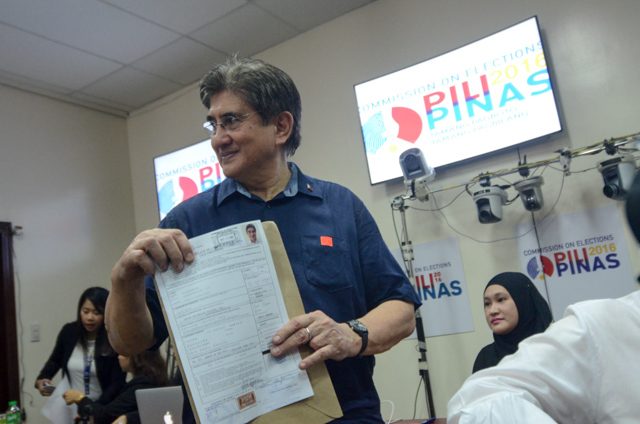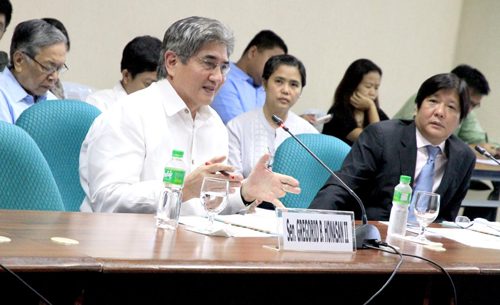SUMMARY
This is AI generated summarization, which may have errors. For context, always refer to the full article.

MANILA, Philippines – He was an infamous rebel who planned to overthrow the late dictator Ferdinand Marcos but Senator Gregorio “Gringo” Honasan II believes the former president’s son should not be “burdened” with his father’s record.
Honasan told Rappler that even if he is running against Senator Ferdinand “Bongbong” Marcos Jr for the vice presidency, the younger Marcos must not be criticized for corruption, ill-gotten wealth and human rights abuses under his father’s watch.
The opposition candidate said he agrees with Senator Marcos that the legacy of his father must not be made an issue in the May 2016 election. (READ: Marcos: Filipinos want solutions, not history talk)
“Of course when we say Martial Law, our answer must be, ‘Never again.’ But it’s not right that we blame the son for the sins of the father. So will we punish even Senator Bongbong’s grandchild? That’s not us as a people,” Honasan said in an interview.
Honasan, 67, is the running mate of opposition leader Vice President Jejomar Binay of the United Nationalist Alliance (UNA). (READ: Honasan: ‘Binay and I fought for same principle’)
During the Marcos regime, he was a colonel who led the Reform the Armed Forces Movement (RAM), which protested corruption and patronage in the military. Along with then Defense Minister Juan Ponce Enrile, Honasan and RAM planned to remove Marcos from power, but the foiled plot led to the 1986 EDSA People Power Revolution, restoring democracy and sending the Marcoses to exile.
Now, Honasan is again on opposite sides with a Marcos as the former first family eyes a return to Malacañang. Senator Marcos of the Nacionalista Party is finalizing a tandem with Senator Miriam Defensor Santiago.
Honasan said voters must judge Marcos based on his own record. Marcos was a representative, and governor of his father’s home province of Ilocos Norte.
“Let him prove himself in the free market of vision, leadership and ideas. If the Filipino people elect him, who are we to oppose that? But it’s not right to say that the perceived sins of the father are also the sins of the son. I do not want that done to me and my children. We have to put our foot down here,” Honasan said.
Marcos’ vice presidential bid opened old wounds from martial law. Human rights groups and martial law victims vowed to campaign against him. They took issue with his refusal to apologize for the deaths, torture, corruption, cronyism and the loss of civil liberties that marred his father’s leadership. (READ: ‘Bongbong Marcos knows what to apologize for’)
Asked about the senator’s refusal to acknowledge the dark side of martial law, the rebel-turned-lawmaker said, “Do we let him carry the burden of his parents, his father?”
He echoed the pronouncements of the Marcos heir.
“Let history be the judge of that. This coming election will be a vindication of what his father did or did not do. To jump the gun by mob rule, let’s not do that,” Honasan said.

‘Martial Law a missed opportunity’
Honasan has emphasized the importance of due process, especially after he and other opposition leaders were implicated in the pork barrel corruption scam. Accused of siphoning off development funds to bogus non-governmental organizations, the senator said he is prepared to respond to the allegations still pending before the Ombudsman.
He is fond of citing the Bill of Rights of the 1987 Constitution in defending due process even for controversial politicians.
Despite his stand on Senator Marcos, Honasan said he does not gloss over the abuses of the late dictator which prompted him to become a rebel in the first place.
Marcos put the Philippines under Martial Law from 1972 to 1981 ostensibly to instill order amid the communist insurgency and the Muslim separatist movement but critics saw it as a tool to extend his rule and to accumulate power.
Honasan called Martial Law “a missed opportunity.”
“Whether you like it or not, the first few years of Martial Law were years of clarity. It inculcated national discipline. We were beginning to think as a people. But it was extended. It’s true there are abuses. The human rights violations, those are true.”
Honasan admitted that he initially followed orders but there were “restrictions.”
“I was a soldier then, and I’m still a good soldier. I have to tell you as a soldier, I never looked back to check if the one giving the order was backed up by the Constitution and he was not crazy. When he said that’s the enemy, we pursued the mission. I follow orders but only up to a certain point. If you can’t explain it, then something like 1986 happens,” Honasan said.
He said even the peaceful EDSA uprising that was hailed worldwide was another missed opportunity.
“When the people and soldiers come together under moral leadership, change is possible. But that change must now happen between elections, not during the campaign period,” Honasan said.
Track record over ‘trial by publicity’
Honasan joined other candidates in decrying “black propaganda” and “trial by publicity” as the campaign heats up.
Marcos, for example, issued two statements this week saying text messages branding him as the son of a dictator were part of “smear tactics.”
“We owe it to the electorate to elevate the level of the discussion, especially of the pressing issues facing the country today such as our problems on drugs, rising prices and criminality, and how we plan to address them,” Marcos said.
Honasan agreed that politicians must focus on issues but stressed that only a candidate’s track record will assure voters that promises can be kept. He is campaigning on a platform of national security. (READ: Gringo Honasan’s to-fix list for 2016)
He said his experience as a soldier of 17 years, a rebel of 7 years, and a senator of 18 years allows him to see martial law, EDSA, and the current state of governance in perspective.
“We commemorate Martial Law. I think it is more important and fitting for us to remember what happened 30 years ago in EDSA. In 1986, we faced the most oppressive, hard-headed government, but when the people got together, that force is irresistible.” – Rappler.com
Add a comment
How does this make you feel?
There are no comments yet. Add your comment to start the conversation.